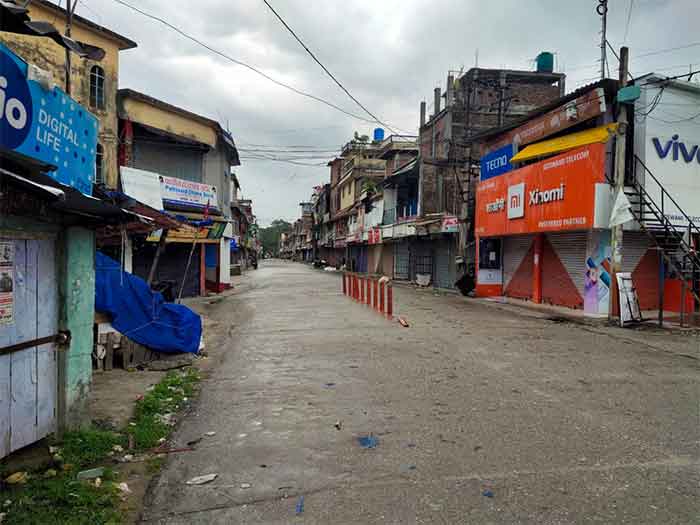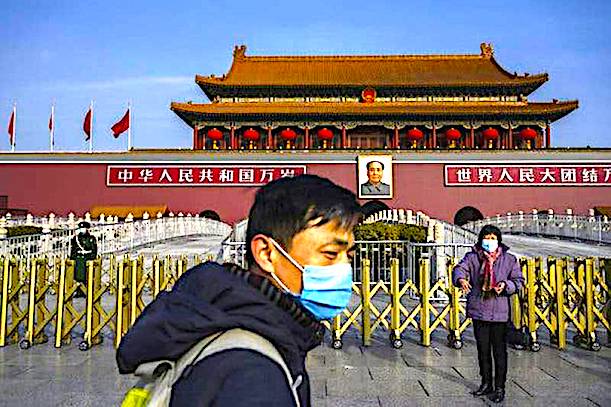Businessmen in the border towns of West Bengal and Sikkim struggle to survive, repay loans, as restrictions on movement of goods between neighbouring countries close markets.

Siliguri: The closure of India’s borders with Nepal and China owing to the COVID-19 pandemic has forced a large number of traders to shut shop, as they forego their only source of income. Unable to keep their businesses alive after the blockade stopped the arrival of customers from the other side of the border, financial constraints have forced these traders to search for other occupations to meet their expenses.
Before the pandemic started spreading in early 2020, the 39-year-old Panitanki market near the Indo-Nepal border in West Bengal used to be abuzz with customers from across the neighbouring country. Ever since the Union government closed the border, truckers have stopped carrying goods to Nepal, and as a consequence, only around 50 of the 1210 shops in this market are currently in operation.
When Covid Response Watch spoke to a few traders who had to shut their shops in Panitanki market, they said that they had no other option because their earnings had dropped so low that they couldn’t even pay the rent on the shops. Those who were still opening their shops said that before the pandemic struck, they used to earn up to Rs 4 lakhs a month. However, during the past 14 months since the border closed, their monthly incomes dropped below Rs 14,000, they said.
Several of these traders said that they were unable to repay the loans they had taken towards running their shops. When the first wave of coronavirus infections hit the country last year, the Union government had announced a moratorium on the backlog of loan payments. However this year, when the second wave of the infections hit harder, the government announced no such relief measures, leaving them struggling to make ends meet, they said.
 Dipak Chakraborty, who is the joint secretary of the Panitanki Babaii Samity and runs a bicycle business at Panitanki market, said that the rent rates for shops in the market range between Rs 15,000 and Rs 50,000 a month. He said he used to sell around 1,000 cycles in a month on average but after the border closure, the number has dropped to barely four bicycles in a month.
Dipak Chakraborty, who is the joint secretary of the Panitanki Babaii Samity and runs a bicycle business at Panitanki market, said that the rent rates for shops in the market range between Rs 15,000 and Rs 50,000 a month. He said he used to sell around 1,000 cycles in a month on average but after the border closure, the number has dropped to barely four bicycles in a month.
“Most of our customers come from Nepal. The border closure 14 months ago completely stopped their arrival. We are open for trade between 7 am and 10 am and between 12 noon to 3 pm, but there is no business. We hope the government will open the border soon. Otherwise survival will be a big question before us,” he said, adding that the market had witnessed a similar situation in 2016 when the border was sealed for 87 days without any official declaration.
“The export has dropped to about 10 percent of what it used to be. Truck drivers refuse to carry goods to Nepal, saying that they are not allowed to step out of their vehicle after they cross the border because of the spike in the COVID-19 cases in India. The average number of trucks carrying goods to Nepal has dropped from 500 to 40 a day,” Chakraborty said.
Ashok Goswami, a garment trader in Panitanki market, said, “I had to close down my shop after sales dropped and pressure started to mount from the building owner to clear the backlog of rent. Besides turning down my request to reduce the Rs 15,000 monthly rent in view of the drop in business, the owner has refused to return the security money I had deposited with him at the time of renting the shop. At present, I have no income. My two sons are taking care of me. My elder son is the distributor of a soft drink brand and the other runs a garment store in Naxalbari. They, too, are facing hardships because of the COVID-19 restrictions,” he said.
Nathu La shut down hits seasonal trade
The situation is similar in Sikkim. In view of the pandemic, the tiny Himalayan state indefinitely suspended the annual trade between India and China through the Nathu La route that used to take place from May 1 to November 30. The Nathu La trade route was reopened in 2006, after 44 years of closure since the Chinese aggression in 1962. The businesses of around 250 traders who operated near the Nathu La pass depended on goods movement through this route for export and import. They said the closure of the trade route during the past two trade seasons has incurred each of them a loss of at least Rs 14 lakhs. What dealt an additional blow to the businesses of the traders in this region was the cancellation of the Kailash Mansarovar Yatra.
Tenzing Chepel, the General Secretary of Indo-China Border Trade Welfare Association, said, “The trade between the two countries takes place once in every six months, but it has stopped since the COVID-19 outbreak last year. Every year, the Standard Operating Procedure changes, and the list of permitted items to be traded is published by the Sikkim government. After the closure of the border, we have to travel all the way to Siliguri to fetch the items to be traded, and that too, at double the price.”
During the 2019 trading session, the traders exported goods such as vegetable oil, rice, processed and canned food, textiles and copper items worth Rs 39.73 crore against an import of readymade garments, blanket, carpets, shoes and quilts worth Rs. 3.16 crore. Chepel, who had been running his textiles business for the past eight years, said that because of the closure of the Nathu La pass during the past two trade seasons, most of the traders lost their main source of income. Expecting the blockade to continue for the next season too, many traders have switched their professions, he said.
“The traders are deep in financial crises and are looking for other options to earn their livelihood. The annual trade between the two countries was the only source of income for them. They used to earn between Rs 7-8 lakhs each season. The state government is not taking any steps to help us,” he said.
Roshan Gupta is a Siliguri-based freelance journalist and a member of 101Reporters.com, a pan-India network of grassroots reporters.
Related posts:
Related posts:
Views: 0
 RSS Feed
RSS Feed

















 July 22nd, 2021
July 22nd, 2021  Awake Goy
Awake Goy 




 Posted in
Posted in  Tags:
Tags: 
















